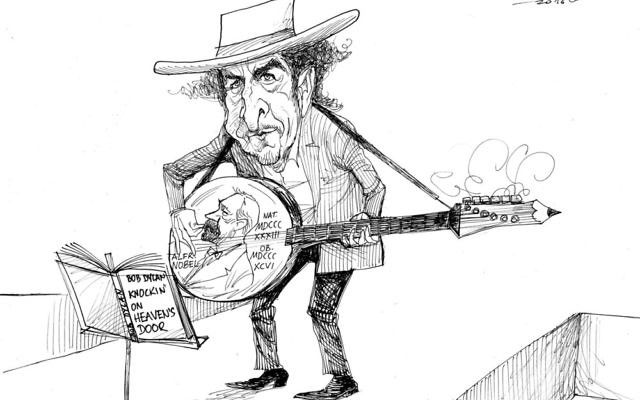Our View: Nobel Snub
Bob Dylan’s selection as this year’s Nobel laureate in literature, announced Thursday, Oct. 13, likely marks the first time most of us have paid attention to the prize in years.
Go ahead: Without using Google, name any of the past five winners of the Nobel Prize in Literature.
So the Nobel Committee for Literature has accomplished its No. 1 goal by giving the prize to a songwriter for the first time: It has made the literary tastes of an unknown group of Scandinavians relevant — or at least the subject of hot takes on blogs and social media, especially among the baby boomers who form the core of Dylan’s fans.
We don’t have any special qualifications as literary critics, but, given that we’re doing our best to fill that role in our preview of the Book Festival of the Marcus Jewish Community Center this issue, we can’t resist responding to the Swedish judges.
They made a bad call.
We acknowledge Dylan’s genius, and we agree that, to the extent lyrics are poetic, they deserve literary recognition.
But to be judged as literature, songwriters’ words must stand on their own and not be considered in combination with music. And while many of Dylan’s lyrics do work as stand-alone poetry, most do not. They’re literature, but they’re not great literature.
It’s easy to create a long list of great Dylan songs, starting with “The Times They Are a-Changin’,” “Blowin’ in the Wind,” “Like a Rolling Stone,” “Knockin’ on Heaven’s Door,” “All Along the Watchtower,” “A Hard Rain’s A-Gonna Fall” and “Shelter From the Storm.”
But similar lists could be created for Paul McCartney, Eric Clapton, Paul Simon, Carole King, Bruce Springsteen, Kris Kristofferson, Willie Nelson, Stevie Wonder, Michael Stipe, Merle Haggard (he was still alive when nominations were due in January) and so many other living songwriters across genres.
More important, however, is that while an argument can be made for Dylan — after all, the only real criterion for selection is that a qualified person submitted a formal nomination — too many great living writers were overlooked so that the Nobel Committee could gain headlines and buzz.
The most prominent snub, again, is someone who, like Dylan (born Robert Zimmerman), is a product of the American Jewish community: Philip Roth. Few writers in the world have matched the quality and influence of Roth since 1950, but he has fallen victim to the committee’s desire to use the prize to highlight non-Western, particularly non-American, writers.
Before Dylan, the last American to win was Toni Morrison in 1993. The last American man was Joseph Brodsky in 1987. The last man born in the United States was John Steinbeck in 1962.
The committee’s stated reason for breaking the long American drought with Dylan could apply to many others: “for having created new poetic expressions within the great American song tradition.”
Sara Danius, the permanent secretary of the Swedish Academy, described Dylan as a great poet in the English-speaking tradition who “can be read and should be read.”
Can be read, yes, but should be heard. Without the music, he’s no Robert Frost (who didn’t win the Nobel) or W.B. Yeats (who did). And with Dylan, the Nobel Prize slips further from being the mark of true literary greatness.




comments